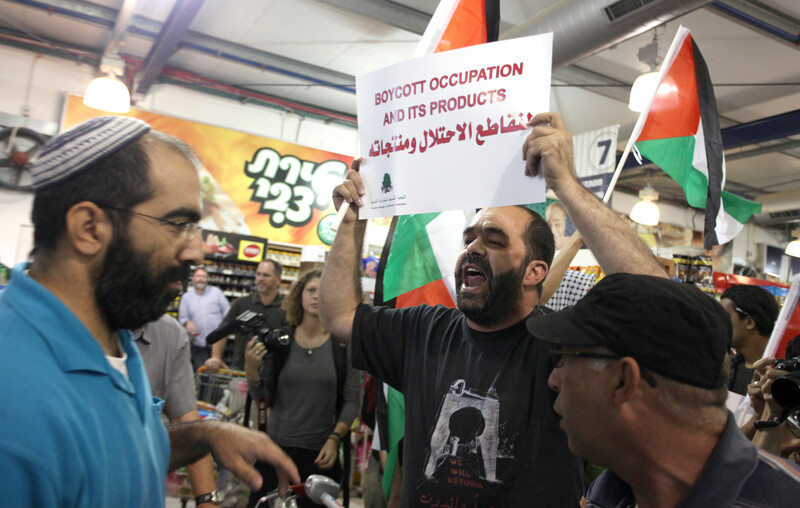The Electronic Intifada 18 June 2013

Palestinian activists rally inside a Rami Levy supermarket in Sha’ar Binyamin settlement, October 2012.
APA imagesIsraeli supermarket tycoon Rami Levy appears intent on becoming a real estate developer in the occupied West Bank by building new shopping centers in illegal settlements.
On 28 May, Levy announced that he was teaming up with the firm Mega Or Holdings to build a mall in Ariel, a Jewish-only settlement.
The Israeli newspaper Haaretz has reported that the mall will cost 100 million shekels ($27.5 million) and is slated for completion within two years. Some 3,000 square meters of the complex will be devoted to a Rami Levy supermarket. In total, it will have 11,000 square meters of retail space and 5,000 square meters for offices.
Other Israeli companies indicating an interest in having branches in the mall include the clothes retailers Castro and Fox and the health food specialist Nitsat Haduvdevan. According to the Who Profits research project, these three firms already operate stores in the occupied West Bank (“First supermarkets, then cell phones, now Rami Levy is developing malls,” 3 June).
According to Who Profits, Levy already operates a network of supermarkets in settlements within the West Bank, which are illegal under international law. These are located in the Israeli-controlled industrial zones of Mishor Adumim and Sha’ar Binyamin and in the settlements of Beitar Illit, Gush Etzion and Ramot.
Jewel
In its financial report covering the first three months of this year, the firm Rami Levy Shivuk Hashikma stated its intention to develop a supermarket in Ariel during 2014 but did not give details of the wider plan for a shopping mall there. It also signaled that a supermarket will be opened in Atarot, another industrial zone which Israel has developed in the West Bank.
The jewel in Levy’s real estate venture could be a new shopping center in Israeli-occupied East Jerusalem.
Levy is mulling the possibility of building a mall on a site earmarked for a commercial development. If it goes ahead, this would be the only shopping center in a catchment area for 200,000 people. This includes 120,000 Palestinians living in refugee camps and neighborhoods like Shuafat, Bir Nabala and Beit Hanina, as well as 80,000 Israelis in the settlements of Pisgat Zeev and Neveh Yaakov.
Osnat Zagrunt from the mall’s leasing agency Moira YLY Properties and Investments has told Haaretz that the impetus behind the project is for Israeli franchises “to get into the Arab sector.” The mall would have some shops targeting Palestinian clients, she indicated. The Palestinian household appliance chain A. Sbitany & Sons is expected to open a 1,500-square-meter outlet in the center.
Exploitation
The Jerusalem mall would mark a new stage in Levy’s involvement in the occupation economy. As indicated by Who Profits, this involvement began with providing services to Israeli settlers and continued with the exploitation of Palestinians as a cheap labor force in his supermarkets. He now appears to be turning his attention to massive construction projects on occupied Palestinian land and the exploitation of a Palestinian captive market in the East Jerusalem.
It is no wonder that the residents of the refugee camps and neighborhoods of East Jerusalem don’t have a local Palestinian alternative to Levy’s enterprise. Since the June 1967 occupation of East Jerusalem, the various Israeli-controlled municipal authorities and the Israeli interior ministry have applied policies aimed at guaranteeing a Jewish majority in the city. One of the main methods of controlling Palestinians in East Jerusalem is the placing of restrictions on planning and building in Palestinian areas.
Only 13 percent of the total land area in East Jerusalem is zoned for Palestinian building. The Israeli human rights group Ir Amim has stated: “The current planning realities in East Jerusalem serve to thwart de facto nearly every Palestinian building plan, whether at the stage of approving the plan itself or later on, at the stage of issuing of a building permit” (“Making bricks without straw,” January 2010 [PDF]).
Because building permits are almost impossible to obtain from the Israeli authorities, Palestinians in East Jerusalem have no choice than to build without them, risking house demolitions or forced evictions. This discriminatory planning policy explains the lack of a Palestinian-owned mall in East Jerusalem.
Captive clients
Rami Levy is in a position that would allow him establish a large mall on “virgin land” because the Israeli authorities have prevented Palestinian businesses from competing with Israelis.
Levy’s plan would take advantage of the fact that Palestinians do not have other large-scale retail facilities. A flourishing market in Bir Nabala was destroyed by Israel’s wall in the West Bank. And venturing into West Jerusalem is not an option for Palestinians, most of whom live below the poverty line.
Although there is every likelihood that the Israeli authorities will portray Levy’s mall as beneficial to Palestinians, there are important facts to be remembered. Palestinians entering his mall will not be exercising the right of a consumer to informed choice. Rather, they will be captive clients — belonging to an occupied people.
Rona Moran is a research coordinator with the Who Profits from the Occupation project.

